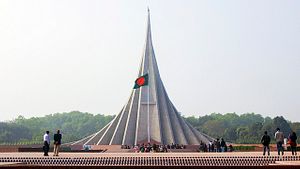Though the details remain mired in uncertainty as of this writing, armed gunmen assaulted a restaurant in Dhaka, the capital of Bangladesh, on Friday evening. The incident sparked a 12-hour hostage standoff, which was resolved when Bangladesh Army commandos stormed in on early Saturday morning. Final casualty counts remain unclear, but at least two police officers were killed in initial gunfire. At least 26 people were wounded.
The targeted institution was the Holey Artisan Bakery in Dhaka’s Gulshan neighborhood, an upscale area frequented by foreign diplomats. The Islamic State group quickly claimed the attack through its social media accounts. The New York Times counts this attack as the 19th claimed by the group in Bangladesh; a spate of recent terror attacks and targeted killings have focused on Hindus, Christians, Buddhists, and other minorities, in addition to foreigners. Given the reputation of the targeted restaurant as a popular spot for foreigners and diplomats in Dhaka, several commentators and terrorism experts have suggested that the global terror group could be responsible.
The Islamic State isn’t the only possible transnational sponsor of the attack; this could have also been carried out by fighters for al-Qaeda in the Indian Subcontinent’s (AQIS) Bangladesh affiliate Ansar al-Islam. (The group had claimed a recent attack against an openly atheist law student and was designated a foreign terror organization by the United States just this week.) The coordination of the attackers, combined with their preference for urban warfare-style tactics, echoes Islamic State-claimed attacks in other cities, including this week in Istanbul and Jakarta earlier this year. (The Islamic State claimed the latter, but not the former, as of this writing.) In Bangladesh, the Islamic State has claimed responsibility for attacks against Italian and Japanese expatriates. AQIS, meanwhile, has yet to claim for the attack.
Details will emerge in the coming days, clarifying the motives behind the attack and the identities of the attackers. However, Friday’s attack underlines the worrying and inexorable rise in the use of terror tactics by militant groups in the country. The Bangladeshi government had long sought to underplay the rise of terror attacks in the country, largely ignoring a spate of targeted killings against religious minorities and secularists. Though it acted recently, arresting around 8,000 in a crackdown on extremist violence, politics in the country have left tensions high.
Apart from the growing footprint of transnational terror organizations like the Islamic State and al-Qaeda, Bangladeshi politics have fissioned around secularist and Islamist lines, particularly over the last three years. Though the secularist Awami League is the nationally dominant governing party, led by Prime Minister Sheikh Hasina, supporters of the opposition (including the Islamist Jamaat-e-Islami) have turned to violence over a series of trials that sought to hold accountable war criminals from the 1971 war of independence. Expert analysis of extremism in the country–such as this recent April 2016 report by the International Crisis Group–has also suggested that the Awami League government’s use of heavy-handed tactics against the opposition was pushing Islamists into a corner, prompting violent backlash.
We’ll learn more about the circumstances of this attack in the hours and days to come, but it’s clear that Bangladesh will increasingly have to reckon with the twin problems of home-grown and transnational terrorism.
The newly released July issue of The Diplomat contains an exclusive look at the factors leading to a rise in extremism in Bangladesh.

































